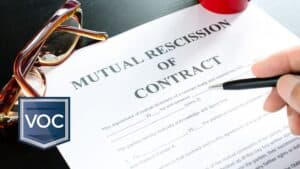Over the past few weeks, we’ve been talking a lot about the realities and possibilities of vacation ownership during a global pandemic. As we head into month two of our country’s attempt to slow the spread of the coronavirus, it’s becoming more apparent this isn’t going to be a temporary thing. Many of you are reading this right now because you’re starting to realize your timeshare contract could soon present you with some problems. Some of you may already be in the midst of a financial hardship and vacation ownership is probably the last thing on your mind. So what can you expect if you stop paying for it?
Look, no one can really prepare for the international spread of a highly contagious respiratory illness. But the perpetual agreements signed by timeshare owners really rains on a parade doesn’t it? Whether you fully understand what this obligation entails or not, owners will more than likely be held accountable for payment during this time. It’s how many past owners facing hardships have been treated. To date, resorts haven’t said anything to otherwise reassure timeshare owners during the COVID-19 crisis. Expecting empathy from an industry that fails to disclose contract terms during the sale is risky.
Understanding Your Timeshare Contract is Important.
While it may seem like our goal here is to slander the industry to acquire new clients, that’s not the case. The last thing we want you to do is rush the cancellation process before exhausting all of your options. Sometimes, you just need an advocate to help point you in the right direction. But for the most part, you need someone to be honest with you so you can make intelligent decisions. Waiting on the resort to give you a break during a financial hardship can be extremely inconvenient, frustrating and even more costly. Either way, you don’t deserve to be aimlessly led down a road that seems fair.

No matter the reader’s perspective, VOC believes that all vacation owners should be able to seamlessly enjoy their purchase. The problem is, this was rarely the case even before this pandemic arrived. Since most buyers aren’t properly informed, disappointments lead to further purchases and even penalties. Plenty of our clients have called us because their timeshare has drained them financially. We can only assume this will continue.
Now that the coronavirus has thrown a wrench in everyone’s activities and plans, it’s going to be extremely difficult for anyone to appreciate and relish in the decision to buy a timeshare. Whether you think you have a good enough reason to walk away from the burden or not, it’s important to understand what can take place if you do.
When You Can’t Pay For Your Timeshare.
Many of you were ecstatic when you first made the decision to buy a timeshare. Going on vacation every year is a big financial commitment that most people never get to enjoy. It feels good to be able to escape. At the time, none of you were thinking about the possibility of financial hardship – let alone forced social distancing. Some of you just made the purchase last month and now you’ve lost your job. With the job market at a standstill, unemployment will only take you so far. So what can you expect from the timeshare company? Moreover, what can you expect from a company that claims to know how to legally terminate timeshare contracts?
Financial Hardships Don’t Stop Collection Attempts.
If there’s one thing that has remained consistent since timeshare travel came about, it’s that complaints have never been paid much attention to. The focus and capital always seems to funnel towards sales tactics and collection attempts. This has been evident for quite a while now. No matter the cost to them, timeshare companies and resorts will make sure they’re paid in full. If they allow vacation owners to easily escape the contractual burden, their entire business model would be destroyed.
Those that don’t adhere to the contract they signed can expect to be aggressively pursued for payment. Especially if you avoid the resort and refuse to pay in an aggressive manner yourself. If the communication gets to this point, you have to understand that sales organizations will harass you. The first level of collections normally comes from an internal agency or staff, employed by the timeshare. Some of our clients have told us that commissioned salesmen have even threatened them over the phone.

FEAR CAN BE MISLEADING
While it may be comforting to believe the industry could have a change of heart, we also have to understand they’re losing a lot of money right now. If anything, this should lead us to believe that collection attempts could be even more troubling today. Threatening notices for foreclosures or liens could come a lot quicker if the travel ban lasts through the year. Not everyone will stop paying because of financial hardship. Some will deem the expense non-essential or simply boycott payments because they can’t use it.
Timeshare companies will more than likely respond in a way that benefits them best. With a contract on their side, it’s going to be awfully difficult for vacation owners to escape some sort of obligation. You might be racking up fees right now.
There Are Multiple Ways Timeshares Collect Dues.
If you’re able to endure the resort’s collection attempts, just know you’re not in the clear. Once your contract reaches a third party collector, the tactics get to be a little more cunning. Most people don’t understand that there are different ways this can affect your credit differently. Not only is the debt amount likely to increase, but you’re not guaranteed a “paid in full” distinction.
These types of agencies really know how to put the pressure on timeshare owners to take action. By removing the emotion out of the equation, they aim to tactfully remind you of the ramifications of your refusal to pay. If you’re in over your head or you don’t know what to look for in your contract, they can be especially convincing. They know how to create confusion in order to bring the contract current. It’s their job and you should always seek advice in these matters.
At the end of the day, third party collectors work for the timeshare company. Negotiating with them is rarely fruitful and leaves most owners back at the mercy of the resort – even after a large payment is made. If you’re in the middle of a financial hardship and worried your debt is going to put you in a deeper hole, it would be wise of you to seek advice. Threatening you until your contract is current is bad business. If you can’t pay, you have to be smart.

Avoid Timeshare Deception During Financial Hardships.
Remember, the end goal of the timeshare company is to make as much money as they can. It’s always been that way. Their strategy is always going to be to keep you under contract for as long as they can. They’ll tell you that they’re waiving fees and “helping you out” – but the fees would never have been there if they cared. Even bait and switch attempts should be expected during this time. Future promises and guarantees should be taken with a grain of salt, because the proof is in the pudding.
Things that may be available today may not be available tomorrow. Efforts to comfort you while creating fear are common in the industry. Nearly everything presented to prospective buyers and current owners is excessively ambiguous and one sided. The goal has always been to collect as many timeshare payments as they can for times like these. It’s not hard to see right through the business model itself.
Do Struggling Timeshare Owners Have Legal Options?
So what happens when you scrape together enough money to pay off collections but find out your timeshare contract is still active. What will you do if you were counting on the expense being eliminated altogether? When timeshare owners are taken advantage of in this way, they’re usually ready to sue the resort for everything they have. But there’s a reason why so many struggling buyers have failed to find legal success.
For the most part, the contract itself favors the resort. Even class action lawsuits have been known to fizzle after months of planning and organization. No matter what hardship was endured, the agreement remains binding. Even when accusations are valid, many go broke just trying to keep up with the lawsuit. Timeshare companies have millions of dollars and use some of the best lawyers in the world to defend themselves. Competing is difficult when you’re already struggling financially. The simple consideration of this approach is rather foolish.

Many legal teams just aren’t equipped to go up against timeshare companies in a legal battle. If you find yourself committed to restitution, then the best thing you can do is eliminate the burden for good. We’ve written a number of articles that explain the differences between hiring lawyers to litigate and our attorney based process. Working with a company that understands the industry and has success with timeshare litigation can be extremely beneficial. Especially when you can get out with a clean slate for $0 out of pocket with 0% interest.
How Owners Could Pay For Walking Away.
If you decide to just ignore the collection attempts and hope for the best, then there are some things worth considering. Refusing to act responsibly can make this global pandemic far worse for you and your family. Even if you don’t hear from the resort for a few months or even a year, the repercussions could be adding up. Our clients have been known to incur a number of late fees, hidden costs and even unauthorized credit card charges in the past.
Some don’t even know the resort signed them up for a credit card or an additional contract during the point of sale, adding further inconveniences. Many of these scenarios aren’t even known until tens of thousands of dollars have been incurred. Missed payments on maintenance fees and a potential special assessment only makes matters worse. Especially for new buyers who never knew they existed.
Judgements, interest, legal filings, attorney fees and any other administrative costs can really catch a struggling individual (or family) off guard. Timeshare ownership doesn’t come with a forbearance option. In the timeshare’s eyes, your only option is to pay for what you agreed to. Far too many buyers think they’re ahead of the game only to find out they’re behind the curve. At some point, you’re going to have to face the fees that have accumulated because of your decision to walk away.

Be Smart With Timeshare During This Pandemic.
Whether there is a pandemic or not, it’s uncommon for timeshare companies to willingly take back your contract. They don’t care if you now view the purchase as a non-essential expense. They worked hard and paid a lot of money to guarantee your payment. No matter how upset you may get over broken promises, all they have to do is point to the piece of paper you signed. Sadly, this is how they’ve always done business and we have no reason to believe it’ll change.
So do your best to prepare yourself for the unexpected during this time. Even if you never face financial hardships as a timeshare owner, be mindful of everything the purchase entails. There might come a point in time where timeshare travel loses its luster. You never know, going on vacation may never be the same. Waiting or acting irrationally could be costly. With that being said, if you have any questions about legally canceling a timeshare contract, we’d be more than happy to help.







One Response
So, this makes it sound that there is no chance to cancel so don’t even try